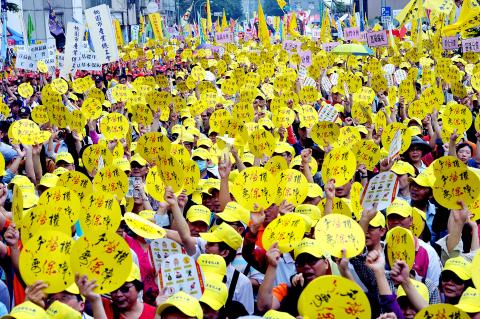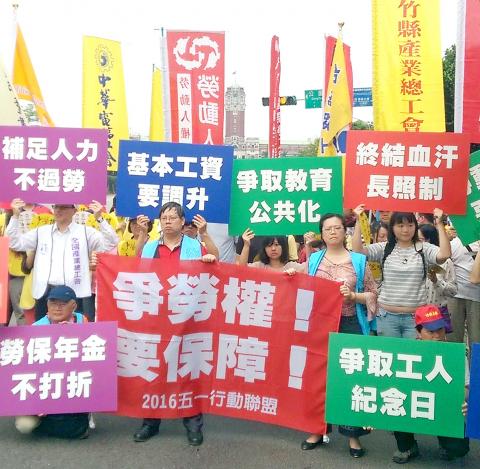Thousands of people yesterday took to the streets of Taipei to mark Workers’ Day, demanding that the government protect workers’ rights, while criticizing the incoming Democratic Progressive Party (DPP) administration’s plans to continue labor policies that the protesters said have worsened working conditions.
The “Fight for Workers’ Rights and Protection” march was joined by an estimated 15,000 protesters, organizers said, starting in front of DPP headquarters and moving to the Legislative Yuan and Ketagalan Boulevard.
Marchers set off firecrackers in front of the Presidential Office Building in a symbolic gesture to “declare war” on the government, saying there would be no honeymoon period for the new Cabinet, calling on it to immediately address labor issues that they said were born of pro-business policies.

Photo: Huang Pang-ping, Taipei Times
Unions issued nine demands: reduced working hours and designated national holidays for workers; no reduction of pensions; an end to atypical employment; a minimum-wage increase; protection of workers’ rights to set up unions, negotiate with employers and organize strikes; address understaffing and overwork issues; an improved public long-term care system; prohibition of mergers between private and public banks to protect public assets; and nationalized education.
“We are at the DPP headquarters today because [president-elect] Tsai Ing-wen’s (蔡英文) policies regarding workers’ rights and social welfare are obscure, and her policies could be a continuance of current rules, which have led to loose labor practices,” Hsinchu Confederation of Trade Unions director Chan Su-chen (詹素貞) said.
“Demands put forward by workers’ unions have been consistent over the past 10 years, because administrations, including those of former president Chen Shui-bian (陳水扁) and President Ma Ying-jeou (馬英九), as well as Tsai’s incoming team, have been or will be attempting to enact contract employment regulations, which would only legalize and increase atypical employment and poverty,” Tainan Confederation of Trade Unions secretary-general Huang Yu-te (黃育德) said.

Photo: Huang Pang-ping, Taipei Times
“The government should investigate contract worker rates and the need for contract employment in a businesses, while the government should phase out contract employment and help contract workers become regular employees,” Taiwan Confederation of Trade Unions director-general Chuang Chueh-an (莊爵安) said.
Chuang said Tsai pledged to establish a minimum-wage law while on the campaign trail, but the former DPP administration only raised the minimum wage once in Chen’s eight-year presidency.
Tsai should immediately increase the minimum wage when she takes office, instead of delaying the move with a prolonged legislation process, Chuang said.
Tsai promised to visit people from all walks of life if she won, but she never visited workers’ groups, Chuang said, urging Tsai to do so and put a stop to the Ministry of Labor’s plan to reduce the number of national holidays by seven.
“All pension reform proposals put forward by different administrations have aimed to extend the retirement age and ask workers to pay more but receive less in pensions, which we do not accept because the so-called reforms are made at the expense of workers. The government should tax large businesses to fund pensions,” he said.
There are 800,000 people with chronic illness or disability who need long-term care, but only about 10 percent of them are covered by the government system, while 90 percent are taken care of by their families or migrant workers, which amounts to the government shifting social responsibility to the public, the groups said.
Tsai’s policy to expand public long-term care is to be financed by tax revenue, but the proposed budget, NT$40 billion (US$1.24 billion), is barely enough, while the DPP has failed to clarify key issues, including where to recruit carers and how to improve their working conditions, the groups said.
Seperately, Tsai posted a photograph on Facebook reiterating her labor policies, which include raising wages; reducing working hours; protecting atypical workers; supporting employment of young, middle-aged and elderly people; giving special care to people involved in workplace accidents; and encouraging unions.

The CIA has a message for Chinese government officials worried about their place in Chinese President Xi Jinping’s (習近平) government: Come work with us. The agency released two Mandarin-language videos on social media on Thursday inviting disgruntled officials to contact the CIA. The recruitment videos posted on YouTube and X racked up more than 5 million views combined in their first day. The outreach comes as CIA Director John Ratcliffe has vowed to boost the agency’s use of intelligence from human sources and its focus on China, which has recently targeted US officials with its own espionage operations. The videos are “aimed at

STEADFAST FRIEND: The bills encourage increased Taiwan-US engagement and address China’s distortion of UN Resolution 2758 to isolate Taiwan internationally The Presidential Office yesterday thanked the US House of Representatives for unanimously passing two Taiwan-related bills highlighting its solid support for Taiwan’s democracy and global participation, and for deepening bilateral relations. One of the bills, the Taiwan Assurance Implementation Act, requires the US Department of State to periodically review its guidelines for engagement with Taiwan, and report to the US Congress on the guidelines and plans to lift self-imposed limitations on US-Taiwan engagement. The other bill is the Taiwan International Solidarity Act, which clarifies that UN Resolution 2758 does not address the issue of the representation of Taiwan or its people in

US Indo-Pacific Commander Admiral Samuel Paparo on Friday expressed concern over the rate at which China is diversifying its military exercises, the Financial Times (FT) reported on Saturday. “The rates of change on the depth and breadth of their exercises is the one non-linear effect that I’ve seen in the last year that wakes me up at night or keeps me up at night,” Paparo was quoted by FT as saying while attending the annual Sedona Forum at the McCain Institute in Arizona. Paparo also expressed concern over the speed with which China was expanding its military. While the US

SHIFT: Taiwan’s better-than-expected first-quarter GDP and signs of weakness in the US have driven global capital back to emerging markets, the central bank head said The central bank yesterday blamed market speculation for the steep rise in the local currency, and urged exporters and financial institutions to stay calm and stop panic sell-offs to avoid hurting their own profitability. The nation’s top monetary policymaker said that it would step in, if necessary, to maintain order and stability in the foreign exchange market. The remarks came as the NT dollar yesterday closed up NT$0.919 to NT$30.145 against the US dollar in Taipei trading, after rising as high as NT$29.59 in intraday trading. The local currency has surged 5.85 percent against the greenback over the past two sessions, central